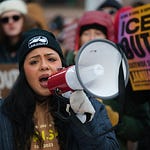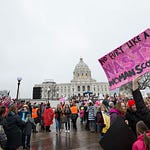Introduction
Our interview with Phil Fuehrer and Bill Halter was a reminder that politics doesn’t have to look the way it does today. As we continue to search for a political home, we were reminded that there is another option beyond the current DFL/Republican duopoly. The newly formed Forward Independence Party is positioning itself as that alternative, with an emphasis on ethical candidates, problem-solving, and a willingness to work across traditional party lines.
The Forward Independence Party will announce its first slate of endorsed candidates for Governor, State Auditor, and Congressional District 6 on Thursday, November 20, at the State Capitol. You can learn more about the party and its candidates on their website: forwardindependencemn.org.
The DFL Listening Tour Gets an Earful
The DFL’s listening session at Sabathani Community Center on Thursday, Nov. 13, underscored the deep internal divide within the party. On one side are those urging the DFL to move toward the center; on the other, activists pushing for a platform closer to that of the Democratic Socialists of America (DSA). As expected, DFL State Chair Richard Carlbom was peppered with pointed questions and criticism, much of it from people who participated in the city convention and likely supported Omar Fateh, Jazz Hampton, or DeWayne Davis.
Only about a quarter of those who wanted to speak actually got a turn at the microphone. The hour allotted to “listening” was too short—especially given that roughly 20 minutes were consumed by a polished PR presentation that boiled down to a message about prioritizing “affordability.” It’s reasonable to assume the 40 or so people still in line would have voiced frustrations similar to the dozen who did speak. Carlbom did his best to acknowledge the dissatisfaction and said he wants to “enlarge the DFL tent,” but there weren’t many in the room who seemed convinced.
The schism in the Minneapolis DFL may not significantly affect statewide races; many disillusioned voters on the left have nowhere else to go if they are aligned with the DSA platform—they’re not about to vote Republican. The bigger challenge for the state DFL may be in the suburbs and rural Minnesota. Party leaders must persuade those voters that, despite the fraud, waste, and abuse that have occurred under Walz and Flanagan, they remain the safest pair of hands to guide the state’s future. That task becomes harder when they must also explain how the state DFL differs from the more liberal Minneapolis DFL. For many outside the city, Minneapolis is already viewed as a crime-stricken, morally adrift “other.” If they come to see the DFL as a quasi-socialist party as well, those voters may be out of reach.
The Property Tax Shakedown
This week, Hennepin County’s Proposed Levies & Taxes statement arrived in the mail. Ours shows a 10.1% property tax increase—in a single year. The county’s tax levy is set to rise 7.79%, pushing its annual budget above $3 billion. While a few outlets cover Minneapolis city politics, coverage of the Hennepin County Board is sparse. That gap is a symptom of a weakened news ecosystem: good reporting is expensive, and it’s increasingly hard to sustain a local media business. Covering levies and county board meetings doesn’t drive clicks.
We live in District 4, represented by Commissioner Angela Conley who was one of the commissioners that voted to raise their salaries by 49%. Her biography on the Hennepin County website notes that she “has worked tirelessly to change systems at the macro level, both at the state and county, in ways that are holistic, person-first and seamless.” Her stated goals include “focus[ing] on housing as a fundamental human right, eliminating race-based disparities in Hennepin County and improving the health and well-being of all Hennepin County residents.” These are worthy aspirations.
But aspirations are not a substitute for accountability. In 2022, Conley ran unopposed and received 98.5% of the vote. In 2026, she will hopefully face an opponent—someone who will talk about the budget and how the county can better contain costs. If no one is willing to challenge her from within the DFL, the Forward Independence Party may become a springboard for a candidate who is tired of constant cost escalation and the ever-rising tax burden. Residents deserve leaders who can balance “person-first and seamless” systems with the everyday pocketbook realities that are making Hennepin County increasingly unaffordable for many of the people who live here.
Conversation Summary
The conversation opens with an introduction to the newly merged Forward Independence Party of Minnesota, represented by state co-chairs Phil Fuehrer and Bill Halter. Phil describes his long history in third-party politics, beginning with the original Independence Party and campaigns dating back to the Jesse Ventura era. Both guests emphasize that the merger of the Forward Party and the Independent Party alliance emerged from a shared frustration with the increasingly polarized, zero-sum nature of two-party politics—and from a belief that Minnesota voters want candidates who prioritize listening, pragmatism, and collaboration over party-line warfare.
The guests detail why the two organizations chose to merge and how aligned their visions already were. They describe a party structure centered on “candidate-forward” flexibility—encouraging candidates to shape their platforms based on the needs of their districts rather than conforming to rigid ideological mandates. Much of the conversation highlights systemic barriers in Minnesota’s party system, including ballot access rules, major-party thresholds, and campaign finance limits, all of which make it difficult for independents to compete. They argue that becoming a major party is essential for leveling the playing field and attracting strong candidates who don’t want to navigate petition requirements or rely on PAC money.
Finally, the discussion turns to the substantive issues the Forward Independence Party hopes to elevate—responsible governance, fiscal realism, political ethics, and forward-looking policy areas like the future of work and artificial intelligence. They stress their commitment to recruiting ethical candidates, embrace evidence-based problem-solving, and can bridge political divides. The episode closes with reflections on election reform, spoiler-effect criticisms, and their belief that Minnesota voters are increasingly ready to consider a viable alternative to the DFL–GOP binary.










